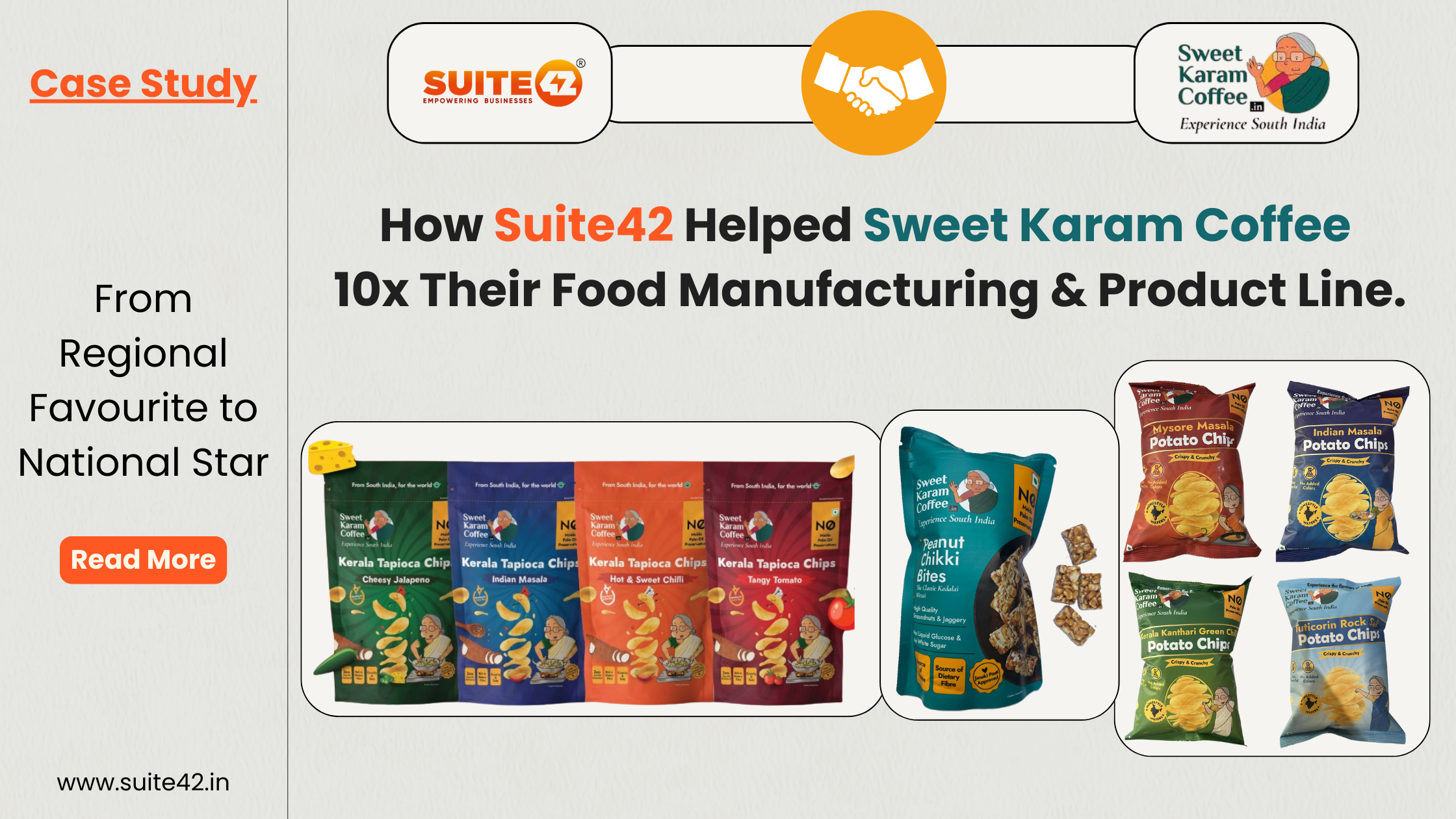
From Local to Global: How Contract Manufacturing Can Help You Expand Your Food Brand Internationally
Introduction
The global food and beverage industry is a complex ecosystem characterized by rapid evolution, heightened competition, and an increasingly discerning consumer base. For food brands aspiring to transcend geographical boundaries, the journey from local prominence to global dominance is fraught with challenges. However, a strategic partnership with a proficient contract manufacturer can serve as a catalyst for accelerated global expansion. By leveraging the expertise of a contract manufacturing partner, food brands can surmount the intricate obstacles associated with entering new markets and cultivate sustainable growth trajectories.
The Global Food and Beverage Landscape
The international food and beverage market is a dynamic arena marked by diverse consumer preferences, stringent regulations, and a proliferation of both local and multinational competitors. To thrive in this environment, food brands must possess a profound understanding of the prevailing market dynamics and possess the adaptability to cater to the unique requirements of distinct consumer segments.
The Role of Contract Manufacturing
Contract manufacturing emerges as a pivotal strategy for food brands seeking to expedite their global expansion endeavors. By outsourcing the production process to a specialized contract manufacturer, brands can concentrate on core competencies such as product innovation, marketing, and brand development. This strategic alliance empowers brands to achieve economies of scale, optimize operational efficiency, and mitigate the risks inherent in establishing overseas manufacturing facilities.
Understanding the International Market
Before embarking on a global expansion journey, a comprehensive assessment of the target market is imperative. Identifying potential opportunities and challenges is crucial for developing a robust market entry strategy. Conducting thorough market research enables brands to gain invaluable insights into consumer behavior, competitive landscapes, and regulatory frameworks.
Identifying Target Markets
The selection of appropriate target markets is a cornerstone of successful global expansion. By meticulously analyzing factors such as market size, growth potential, consumer demographics, and competitive intensity, brands can identify regions that align with their long-term objectives. A well-defined target market segmentation strategy facilitates the development of tailored product offerings and marketing campaigns.

The Importance of Market Research
Market research is an indispensable tool for comprehending the intricacies of foreign markets. By gathering data on consumer preferences, purchasing habits, and cultural nuances, brands can make informed decisions regarding product formulation, packaging, and marketing messaging. Moreover, market research can help identify potential distribution channels and identify key partners.
Navigating Cultural Nuances and Consumer Preferences
Each market possesses distinct cultural and consumer characteristics that must be carefully considered. Adapting products and marketing materials to resonate with local tastes and preferences is essential for building brand loyalty and driving sales. A deep understanding of cultural sensitivities is paramount to avoid missteps that could damage a brand’s reputation.
Building a Strong Foundation: The Contract Manufacturing Partnership
A successful global expansion initiative hinges on the establishment of a robust partnership with a suitable contract manufacturer. The ideal partner possesses a proven track record in the food and beverage industry, a comprehensive understanding of international regulations, and a flexible approach to accommodating diverse customer requirements.
Selecting the Right Contract Manufacturer
The process of identifying and selecting a contract manufacturer demands meticulous evaluation. Key criteria include manufacturing capabilities, quality control systems, regulatory compliance, capacity, and geographical footprint. A thorough due diligence process is essential to mitigate risks and ensure the long-term success of the partnership.
Key Considerations for Partnership Success
Effective communication, shared goals, and mutual trust are fundamental to a successful contract manufacturing partnership. Establishing clear expectations, defining roles and responsibilities, and implementing robust performance metrics are essential for optimizing collaboration and driving results.
Overcoming Challenges in Global Expansion
Expanding into new markets is invariably accompanied by challenges such as supply chain disruptions, currency fluctuations, and geopolitical uncertainties. A well-prepared brand can effectively navigate these obstacles by developing contingency plans, diversifying suppliers, and implementing risk management strategies.

Leveraging Contract Manufacturing for Market Entry
Contract manufacturing offers several advantages for brands seeking to enter new markets. By partnering with a local contract manufacturer, brands can benefit from expedited time-to-market, reduced operational costs, and access to local expertise. This approach enables brands to test market demand and refine their product offerings before making significant investments.
Market Testing and Validation
Before committing substantial resources to a new market, conducting market testing is prudent. By launching a limited product range or conducting consumer surveys, brands can gather valuable feedback and refine their go-to-market strategy. Contract manufacturers can play a crucial role in supporting market testing initiatives by providing flexibility and scalability.
Local Adaptation and Customization
Tailoring products and marketing messages to local preferences is essential for achieving market success. A contract manufacturer with a deep understanding of local consumer tastes can provide invaluable insights and support product development efforts.
Risk Mitigation and Scalability
By partnering with a reputable contract manufacturer, brands can mitigate supply chain risks and enhance operational flexibility. A reliable partner can adapt to changing market conditions and scale production accordingly, ensuring that the brand can meet increasing demand.
An article that might interest you: Red Flags to Avoid When Selecting a Reliable Food Contract Manufacturer
Navigating the Global Regulatory Landscape
Compliance with international food regulations is a complex and time-consuming process. Contract manufacturers with a proven track record in navigating regulatory hurdles can provide invaluable support. By leveraging their expertise, brands can avoid costly delays and reputational damage.
Understanding International Food Regulations
Each country has its own set of food safety and labeling regulations. Staying abreast of these requirements is essential for ensuring product compliance and market access. Contract manufacturers can assist brands in understanding and meeting regulatory obligations.
Ensuring Compliance and Building Trust
Adherence to stringent food safety and quality standards is paramount for building consumer trust. Contract manufacturers must implement robust quality control systems and obtain the necessary certifications to demonstrate their commitment to food safety.

Supply Chain Optimization for Global Markets
A well-optimized supply chain is essential for delivering products to consumers efficiently and cost-effectively. By leveraging technology and building strong relationships with suppliers and logistics providers, brands can enhance supply chain visibility and resilience.
Building a Resilient Supply Chain
Diversifying suppliers, implementing robust inventory management systems, and developing contingency plans can help mitigate supply chain disruptions. A resilient supply chain is essential for ensuring uninterrupted product availability and customer satisfaction.
Leveraging Technology for Efficiency
Technology plays a pivotal role in optimizing supply chain operations. By adopting advanced tools such as supply chain management software and data analytics, brands can improve forecasting accuracy, reduce lead times, and enhance overall efficiency.
Managing Logistics and Distribution Challenges
Overcoming logistical challenges is crucial for successful global expansion. Effective distribution networks, customs clearance procedures, and transportation management are essential for delivering products on time and in optimal condition.
How Suite42 Can Help Brands Expand Internationally
Suite42 is a leading contract manufacturer with a proven track record of supporting food and beverage brands in achieving their global ambitions. Our extensive experience, global footprint, and commitment to excellence make us an ideal partner for brands seeking to expand into new markets.
Suite42’s Global Reach and Expertise
With a presence in multiple countries, Suite42 possesses a deep understanding of diverse cultural preferences and regulatory environments. Our team of experts can provide tailored solutions to meet the unique needs of each market.
Tailored Solutions for International Expansion
Suite42 offers a comprehensive range of services to support brands throughout their global expansion journey. From product development and formulation to manufacturing, packaging, and logistics, we provide end-to-end solutions that drive growth and success.

Conclusion
The journey to global market dominance is complex and multifaceted. However, by leveraging the power of contract manufacturing and partnering with a knowledgeable and experienced provider like Suite42, food brands can overcome challenges, capitalize on opportunities, and achieve sustainable growth.
The Future of Global Food and Beverage Expansion
The global food and beverage industry is poised for continued evolution, driven by factors such as technological advancements, changing consumer preferences, and increasing regulatory scrutiny. Contract manufacturing will play a pivotal role in shaping the industry’s future by enabling brands to adapt to emerging trends and capitalize on new market opportunities.






Leave a Reply